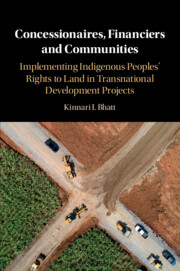 Concessionaires, Financiers and Communities
Concessionaires, Financiers and Communities Book contents
- Concessionaires, Financiers and Communities
- Concessionaires, Financiers and Communities
- Copyright page
- Dedication
- Contents
- Preface
- Acknowledgements
- 1 Development Projects, Indigenous Peoples’ Land Rights and Rights Implementation
- 2 Characteristics of Indigenous Peoples and Development Projects
- 3 In the Shadows of the Operational Development Project
- 4 Bridging the Gap through the Elephant in the Room?
- 5 Discretion, Delegation, Fragmentation and Opacity
- 6 Pricing for Poverty
- 7 Negotiating Land Outcomes
- 8 Moving Forward
- Index
5 - Discretion, Delegation, Fragmentation and Opacity
Impacts of Financing Mechanisms in Mongolia and Panama
Published online by Cambridge University Press: 02 March 2020
- Concessionaires, Financiers and Communities
- Concessionaires, Financiers and Communities
- Copyright page
- Dedication
- Contents
- Preface
- Acknowledgements
- 1 Development Projects, Indigenous Peoples’ Land Rights and Rights Implementation
- 2 Characteristics of Indigenous Peoples and Development Projects
- 3 In the Shadows of the Operational Development Project
- 4 Bridging the Gap through the Elephant in the Room?
- 5 Discretion, Delegation, Fragmentation and Opacity
- 6 Pricing for Poverty
- 7 Negotiating Land Outcomes
- 8 Moving Forward
- Index
Summary
This chapter contextualises how project finance mechanisms interface with indigenous land rights recognition and implementation, and the effects of that convergence for communities in Mongolia and Panama. I analyse how, in two cases, lender safeguarding policies are prioritised through the ordinary and mechanical stream of lender decision-making and the contractual networks that operationalise those policies, questioning the effectiveness of those policies to deliver fair, rights-compliant outcomes. I examine how private environmental and social experts, hired by the borrower, will sort and (de)prioritise local and international norms on indigenous rights and decide which social safeguard policies a borrower should comply with, and how. This provides insights into the operation of law and power in this field: specifically, the fragmented, de-prioritised and powerless nature of different sources of formal indigenous rights norms as they sit against contractual and policy norms. A larger question is of an over-reliance on private experts, the lack of transparency around their decision-making and a deficiency in independent regulatory oversight over these routinely delegated processes.
- Type
- Chapter
- Information
- Concessionaires, Financiers and CommunitiesImplementing Indigenous Peoples' Rights to Land in Transnational Development Projects, pp. 123 - 144Publisher: Cambridge University PressPrint publication year: 2020


